Nyack Climate Vulnerability Assessment and Adaptation Plan
Community-Wide Planning for Ongoing Preparedness and Adaptation
The Village of Nyack has adopted a climate vulnerability assessment and adaptation plan that was developed in 2025. We researched future projections for climate hazards in our region, conducted a public survey, and held workshops and meetings with many stakeholders, focusing on impacts of increased heat and heat waves, extreme weather events – including and increased precipitation and flooding, sea level rise and storm surge, and climate change-related disease. Based on that assessment, we drafted a plan that includes a Vision of how Nyack will rise to the challenge and maintain its resilience in the years ahead, and Action Checklists to guide us in a community effort.
This is a project of the Village of Nyack, funded by a grant from the NYS Department of Environmental Conservation’s Hudson River Estuary Program
Questions? Contact the Project Coordinator at mbdenker@gmail.com
Nyack Climate Risk and Resilience Workshop March 24, 2025
A presentation and community discussion about Nyack’s adaptation planning project with representatives from O&R, Rockland County Department of Fire & Emergency, Nyack Climate Smart Committee, Upper Nyack Green Committee and other community members.
The Project
The climate is changing. Extreme weather events, higher temperatures, rising sea levels, and extreme weather, with more precipitation and flooding, are happening now and are projected to get worse. In creating this plan, we took a detailed look at risks that are likely to impact our community as a result of climate change and developing ways to address them now and in the years to come.
Assessing Vulnerability and Considering Hazards
The first step was to assess how vulnerable the assets in our community are. To what degree are the people, infrastructure, ecosystems, economy, and services in our community susceptible to climate hazards related to climate change, and how well can the these assets cope?
What do we mean by climate hazards? They are natural or human-induced physical events or trends that may cause loss of life, injury, or other health impacts, as well as damage and loss to property, infrastructure, livelihoods, service provision, ecosystems, and environmental resources. We will use local knowledge and reliable, current research about projections for local conditions to ground our understanding of hazards that may affect our community.
Planning for Adaptation and Becoming Resilient
With a better understanding of our vulnerability, we planned ways to adapt. Adaptation refers to the ways we modify or adjust our understanding of our situation in changing circumstances and develop responses accordingly. The Adaptation Plan lays out tools and strategies to help create a resilient community—one that can respond and recover quickly when faced with the climate change challenges as we understand them now, and can continue to assess, adapt, and retain that capacity in the future.
Key Resources
-
-
-
-
NOAA Storm Events Database
-
-
-
-
Top Concerns
Extreme Heat and Heat Waves
Protecting vulnerable populations
Water quality impacts
Short term droughts and brush fires
Increased demand for air conditioning
Electricity demand, supply and affordability
Building efficiency upgrades and weatherization
Environmental impacts on natural landscape
Extreme Weather - Wind, Rain, Snow, Ice, Drought
Threats to public safety
Property damage – Basement flooding, flash floods, falling trees, frozen pipes, etc.
Impacts on power, water and wastewater infrastructure
Sea Level Rise and Storm Surge
Built Environment – potential flood damage to properties along the waterfront
Waterfront parking lot flooding – damage and evacuation needs
Boats and moorings – damage from wind and wave action
Natural Environment – salt water and flooding damage to plantings
Climate Change-Related Illness
Heat related illnesses
Respiratory diseases related to air quality – ground level ozone and wildfire smoke
Vector-Borne Diseases – ticks, mosquitoes
Potential other emerging diseases
Public Involvement
Steering Committee
Bill Batson Steve Cea Andrew Goodwillie Annie Hekker Alain Leinbach Andy Stewart
The Steering Committee, will meet throughout the process of developing the Resilience Plan to bring a range of community perspectives, help plan and implement outreach for the project and provide comments on the draft plan.
Stakeholder Workshop
A workshop to gather feedback from representatives of key organizations, departments and agencies, Winter 2025
See the list of participants here.
Public Survey
A questionnaire to gather feedback all members of the community about their experience with and concerns related to climate change-related hazards.
Public Workshop
A follow-up event after collecting survey results to share information and encourage discussion with the public. Late March 2025.
Plan Review
The draft Resilience Plan will be made available for public comment. Summer 2025.
Coordinating Lead Author
Marcy Denker, Sustainability Coordinator, Village of Nyack
mbdenker@gmail.com
This is a project of the Village of Nyack, funded by a grant from the NYS Department of Environmental Conservation’s Hudson River Estuary Program.

